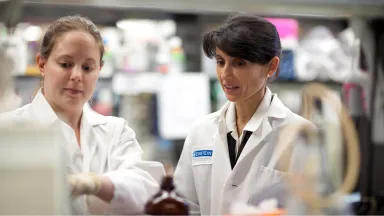
I. David Goldman, M.D.
- Professor Emeritus, Department of Oncology (Medical Oncology)
- Professor Emeritus, Department of Medicine (Oncology & Hematology)
- Professor Emeritus, Department of Molecular Pharmacology
Area of research
- Membrane transport of folates/antifolates; structure-function and regulation of the proton-coupled folate transporter; homology modeling; role in the activities of antifolates within the acidic microenvironment of epithelial cancers
Phone
Location
- Albert Einstein College of Medicine Jack and Pearl Resnick Campus 1300 Morris Park Avenue Block 619 Bronx, NY 10461
Research Profiles
Professional Interests
Structure/function, physiological and pharmacological roles of folate transporters and the genetic and molecular aspects of hereditary folate malabsorption
![]() I have had a long-standing interest in folate transporters and their roles in the delivery of essential physiological folate substrates and antifolate chemotherapeutics into cells. The current focus is on the proton-coupled folate transporter (PCFT- SLC46A1), discovered by this laboratory, and shown to be required for the intestinal absorption of folates and antifolates and their transport across the choroid plexus into the cerebrospinal fluid. PCFT also has a high affinity for certain antifolates and plays a role in their delivery to cancer cells particularly within their acidic microenvironment. This laboratory established that mutations in this gene that result in loss of expression and/or function of the PCFT protein are the molecular basis for the autosomal recessive disorder, hereditary folate malabsorption. Studies have identified residues and domains required for the maintenance of tertiary structure and that: (i) define the external and internal gates of the protein and the aqueous translocation pathway; (ii) bind folates; (iii) determine proton-coupling and proton-binding; and (iv) determine the movement of the protein among its conformational states. Recently, the atomic structure of the chicken PCFT was determined. Current focus is on a three-dimensional homology model of human PCFT developed by the Fiser laboratory, based upon the chicken structure, which in collaborative analyses will provide an understanding of the mechanistic and structural basis for the roles of resides previously demonstrated to be key determinants of PCFT function. Concurrently, as families are identified world-wide with hereditary folate malabsorption, the functional consequences of causative PCFT mutations can be understood along with their potential impact on the clinical phenotype.
I have had a long-standing interest in folate transporters and their roles in the delivery of essential physiological folate substrates and antifolate chemotherapeutics into cells. The current focus is on the proton-coupled folate transporter (PCFT- SLC46A1), discovered by this laboratory, and shown to be required for the intestinal absorption of folates and antifolates and their transport across the choroid plexus into the cerebrospinal fluid. PCFT also has a high affinity for certain antifolates and plays a role in their delivery to cancer cells particularly within their acidic microenvironment. This laboratory established that mutations in this gene that result in loss of expression and/or function of the PCFT protein are the molecular basis for the autosomal recessive disorder, hereditary folate malabsorption. Studies have identified residues and domains required for the maintenance of tertiary structure and that: (i) define the external and internal gates of the protein and the aqueous translocation pathway; (ii) bind folates; (iii) determine proton-coupling and proton-binding; and (iv) determine the movement of the protein among its conformational states. Recently, the atomic structure of the chicken PCFT was determined. Current focus is on a three-dimensional homology model of human PCFT developed by the Fiser laboratory, based upon the chicken structure, which in collaborative analyses will provide an understanding of the mechanistic and structural basis for the roles of resides previously demonstrated to be key determinants of PCFT function. Concurrently, as families are identified world-wide with hereditary folate malabsorption, the functional consequences of causative PCFT mutations can be understood along with their potential impact on the clinical phenotype.
Selected Publications
Selected Recent Publications (Complete publications at PubMed: Goldman ID)
Goldman ID. Hereditary folate malabsorption. GeneReviews (internet). Seattle (WA): University of Washington, Seattle. Updated May 5, 2022
Parker JL, Deme JC, Kuteyi G, Wu Z, Huo J, Goldman ID, Owens RJ, Biggin PC, Lea SM, Newstead S. Structural basis of antifolate recognition and transport by PCFT. Nature 595:130-134, 2021
Zhan H, Najmi M, Lin K, Aluri S, Fiser A, Goldman ID, Zhao R. A proton-coupled folate transporter mutation causing hereditary folate malabsorption locks the protein in an inward-open conformation. J. Biol Chem. 295:15650-15661, 2020.
Aluri S, Zhao R, Lin K, Shin DS, Fiser A, Goldman ID. Substitutions that lock and unlock the proton-coupled folate transporter (PCFT-SLC46A1) in an inward-open conformation. J Biol Chem. 294:7245-7258, 2019
Aluri S, Zhao R, Lubout C, Goorden SMI, Fiser A, Goldman ID. Hereditary folate malabsorption due to a mutation in the external gate of the proton-coupled folate transporter-SLC46A1. Blood Advances 2:61-68, 2018.
Aluri S, Zhao R, Fiser A, Goldman ID. Substituted-cysteine accessibility and cross-linking identify an exofacial cleft in the 7th and 8th helices of the proton-coupled folate transporter (SLC46A1). Am J Physiol Cell Physiol. Am J of Physiol., Cell Physiol. 314:C289-C296, 2018.
Zhao R, Aluri S, Goldman ID. The proton-coupled folate transporter (PCFT-SLC46A1) and the syndrome of systemic and cerebral folate deficiency of infancy: Hereditary folate malabsorption. Mol Aspects Med. 53:57-72, 2017.
Zhao R, Najmi M, Aluri S, Goldman ID. Impact of posttranslational modifications of engineered cysteines on the substituted cysteine accessibility method: evidence for glutathionylation. Am J Physiol Cell Physiol. 312:C517-C526, 2017.
Aluri S, PhD, Zhao R, Fiser, Goldman ID. Residues in the eighth transmembrane domain of the proton-coupled folate transporter (SLC46A1) play an important role in defining the aqueous translocation pathway and in folate substrate binding. BBA Biomembranes.1859:2193-2202, 2017.
Zhao R, Najmi M, Fiser A, Goldman ID. Identification of an Extracellular Gate for the Proton Coupled Folate Transporter (SLC46A1) by Cysteine Cross-Linking. J Biol Chem. 291:8162- 72, 2016.
Shin DS, Min SH, Russell L, Zhao R, Fiser A and Goldman ID. Functional roles of aspartate residues of the human proton-coupled folate transporter (PCFT; SLC46A1); D156, mutated in hereditary folate malabsorption, is critical for protein stability; D109 is irreplaceable. Blood 116:5162-9, 2010.
Zhao, R., Qiu, A., Tsai, E., Jensen, M., Akabas, M., and Goldman ID. The proton-coupled folate transporter (PCFT): Impact on pemetrexed transport and on antifolate activities as compared to the reduced folate carrier. Mol Pharm, 74:854-862, 2008.
Zhao, R., Min, S.H., Qiu, A., Sakaris, A., Goldberg, G.L., Sandoval, C., Malatack, J.J., Rosenblatt, D.S., and Goldman, I.D. The spectrum of mutations in the PCFT gene, coding for an intestinal folate transporter, that are the basis for Hereditary Folate Malabsorption, Blood 110: 1147-1152, 2007.
Qiu, A., Jansen, M., Sakaris, A., Min, S., Chattopadhyay, S., Tsai, E., Sandoval, C., Zhao, M., Akabas, M.H., and Goldman, ID. Identification of an intestinal folate transporter and the molecular basis for hereditary folate malabsorption. Cell, 127:917-928, 2006





